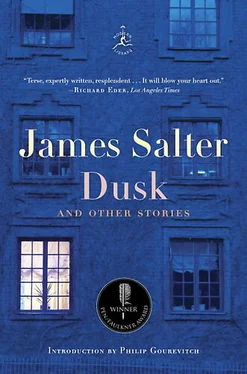“Nadine will be along a little later,” he said.
When he reached for a drink, his hand was trembling.
“My foot slipped off the brake,” he explained. He quickly lit a cigarette. “The insurance pays that, don’t they? Probably not.”
He seemed to have reached a stop, the first of many enormous pauses during which he looked in his lap. Then, as if it were the thing he had been struggling to think of, he inquired painfully, “What do you… think of Basel?”
The headwaiter had placed them on opposite sides of the table, the empty chair between them. Its presence seemed to weigh on Hedges. He asked for another drink. Turning, he knocked over a glass. That act, somehow, relieved him. The waiter dabbed at the wet tablecloth with a napkin. Hedges spoke around him.
“I don’t know exactly what Nadine has told you,” he said softly. A long pause. “She sometimes tells… fantastic lies.”
“Oh, yes?”
“She’s from a little town in Pennsylvania,” Hedges muttered. “Julesberg. She’s never been… she was just a… an ordinary girl when we met.”
They had come to Basel to visit certain institutions, he explained. It was an… interesting city. History has certain sites upon which whole epochs turn, and the village of Dornach gave evidence of a very… The sentence was never finished. Rudolf Steiner had been a student of Goethe….
“Yes, I know.”
“Of course. Nadine’s been telling you, hasn’t she?”
“No.”
“I see.”
He finally began again, about Goethe. The range of that intellect, he said, had been so extraordinary that he was able, like Leonardo before him, to encompass all of what was then human knowledge. That, in itself, implied an overall… coherence, and the fact that no man had been capable of it since could easily mean the coherence no longer existed, it was dissolved…. The ocean of things known had burst its shores.
“We are on the verge,” Hedges said, “of radical departures in the destiny of man. Those who reveal them…”
The words, coming with agonized slowness, seemed to take forever. They were a ruse, a feint. It was difficult to hear them out.
“…will be torn to pieces like Galileo.”
“Is that what you think?”
A long pause again.
“Oh, yes.”
They had another drink.
“We are a little strange, I suppose, Nadine and I,” Hedges said, as if to himself.
It was finally the time.
“I don’t think she’s a very happy woman.”
There was a moment of silence.
“Happy?” Hedges said. “No, she isn’t happy. She isn’t capable of being happy. Ecstasies. She is ecstatic. She tells me so every day,” he said. He put his hand to his forehead, half covering his eyes. “You see, you don’t know her at all.”
She was not coming, suddenly that was clear. There was going to be no dinner.
Something should have been said, it ended too vaguely. Ten minutes after Hedges had gone, leaving behind an embarrassing expanse of white and three places set, the thought came of what he should have demanded: I want to talk to her.
All doors had closed. He was miserable, he could not imagine someone with weaknesses, incapacities like his own. He had intended to mutilate a man and it turned into monologue—probably they were laughing about it at that very moment. It had all been humiliating. The river was moving beneath his window, even in darkness the current showed. He stood looking down upon it. He walked about trying to calm himself. He lay on the bed, it seemed his limbs were trembling. He detested himself. Finally he was still.
He had just closed his eyes when in the emptiness of the room the telephone rang. It rang again. A third time. Of course! He had expected it. His heart was jumping as he picked it up. He tried to say hello quite calmly. A man’s voice answered. It was Hedges. He was humble.
“Is Nadine there?” he managed to say.
“Nadine?”
“Please, may I speak to her,” Hedges said.
“She’s not here.”
There was a silence. He could hear Hedges’ helpless breathing. It seemed to go on and on.
“Look,” Hedges began, his voice was less brave, “I just want to talk to her for a moment, that’s all…. I beg you…”
She was somewhere in the town then, he hurried out to find her. He didn’t bother to decide where she might be. Somehow the night had turned in his direction, everything was changing. He walked, he ran through the streets, afraid to be late.
It was nearly midnight, people were coming out of the theaters, the café at the Casino was roaring. A sea of hidden and half-hidden faces with the waiters always standing so someone could be hidden behind them, he combed it slowly. Surely she was there. She was sitting at a table by herself, she expected to be found.
The same cars were turning through the streets, he stepped among them. People walked slowly, stopping at lighted windows. She would be looking at a display of expensive shoes, antique jewelry perhaps, gold necklaces. At the corners he had a feeling of loss. He passed down interior arcades. He was leaving the more familiar section. The newsstands were locked, the cinemas dark.
Suddenly, like the first truth of illness, the certainty left him. Had she gone back to her hotel? Perhaps she was even at his, or had been there and gone. He knew she was capable of aimless, original acts. Instead of drifting in the darkness of the city, her somewhat languid footsteps existing only to be devoured by his, instead of choosing a place in which to be found as cleverly as she had drawn him to follow, she might have become discouraged and returned to Hedges to say only, I felt like a walk.
There is always one moment, he thought, it never comes again. He began going back, as if lost, along streets he had already seen. The excitement was gone, he was searching, he was no longer sure of his instincts but wondering instead what she might have decided to do.
On the stairway near the Heuwaage, he stopped. The square was empty. He was suddenly cold. A lone man was passing below. It was Hedges. He was wearing no tie, the collar of his jacket was turned up. He walked without direction, he was in search of his dreams. His pockets had bank notes crumpled in them, cigarettes bent in half. The whiteness of his skin was visible from afar. His hair was uncombed. He did not pretend to be young, he was past that, into the heart of his life, his failed work, a man who took commuter trains, who drank tea, hoping for something, some proof in the end that his talents had been as great as the others’. This world is giving birth to another, he said. We are nearing the galaxy’s core. He was writing that, he was inventing it. His poems would become our history.
The streets were deserted, the restaurants had turned out their lights. Alone in a café in the repetition of empty tables, the chairs placed upon them upside down, his dark shirt, his doctor’s beard, Hedges sat. He would never find her. He was like a man out of work, an invalid, there was no place to go. The cities of Europe were silent. He coughed a little in the chill.
The Goetheanum of the photograph, the one she had shown him, did not exist. It had burned on the night of December 31, 1922. There had been an evening lecture, the audience had gone home. The night watchman discovered smoke and soon afterward the fire became visible. It spread with astonishing rapidity and the firemen battled without effect. At last the situation seemed beyond hope. An inferno was rising within the great windows. Steiner called everyone out of the building. Exactly at midnight the main dome was breached, the flames burst through and roared upward. The windows with their special glass were glowing, they began to explode from the heat. A huge crowd had come from the nearby villages and even from Basel itself where, miles away, the fire was visible. Finally the dome collapsed, green and blue flames soaring from the metal organ pipes. The Goetheanum disappeared, its master, its priest, its lone creator walking slowly in the ashes at dawn.
Читать дальше












